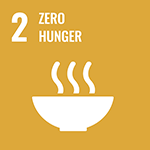The Project for the Development of Wheat Breeding Materials for Sustainable Food Production
Principal Investigator
ODA Recipient Country
-
Research Institutions in Japan
Yokohama City University / RIKEN / Tottori University
Research Institutions in Counterpart Country
-
Adoption fiscal year
FY 2010
Research Period
5 Years
Overview of the Research Project
Development of new wheat varieties and breeding materials deploying novel genes conferring resistance to drought and disease
The counterpart country is still suffering the effects of long years of war, and communities do not yet feel secure. Wheat is the raw material for the naan bread that is their staple food, and wheat is a key crop for the farmers who make up the majority of the country’s population. The Japanese research institute had preserved some of the rich diversity of wheat from the country, allowing those varieties to be cultivated once more. In combination with research at the gene level made possible by science and technology from Japan, breeding materials can be developed for varieties of wheat adapted to the country's environment. In conjunction with capacity development of wheat researchers, those varieties will contribute to building foundations for sustainable food production.
Research into local region wheat germplasms that can no longer be found in their original country because of the effects of war reveals potentially beneficial varieties. They can be used in the development of new varieties, and they can also contribute immediately to enhancing wheat production and making production more reliable for farmers, the vast majority of whom do not yet benefit from irrigation and similar facilities. Researchers of the country trained as part of the project are working on this topic.
Photo gallery
Research Project Web site
Press Release
Links
![]() JICA's World January 2014
JICA's World January 2014
SATREPS Project Case Study
Projects
Contact Us
Japan Science and Technology Agency (JST)
Department of International Affairs
SATREPS Group
TEL : +81-3-5214-8085
Related articles by Category
- Bioresources
Bioresources

 Republic of Peru
Republic of Peru
Stop the invasion and spread of banana wilt from threatening the banana industry!
Establishment of an Alert System for Fusarium oxysporum f. sp. cubense, the Banana and Plantain Wilt Pathogen, and Mitigation Strategy of the Disease
- SDGs : Goal.2
Bioresources

 Republic of Indonesia
Republic of Indonesia
Achieve sustainable vegetable production in tropical regions using advanced breeding technology!
Breeding Innovation in Chili Pepper and Tomato to Accelerate Sustainable Vegetable Production in Tropical Regions






















